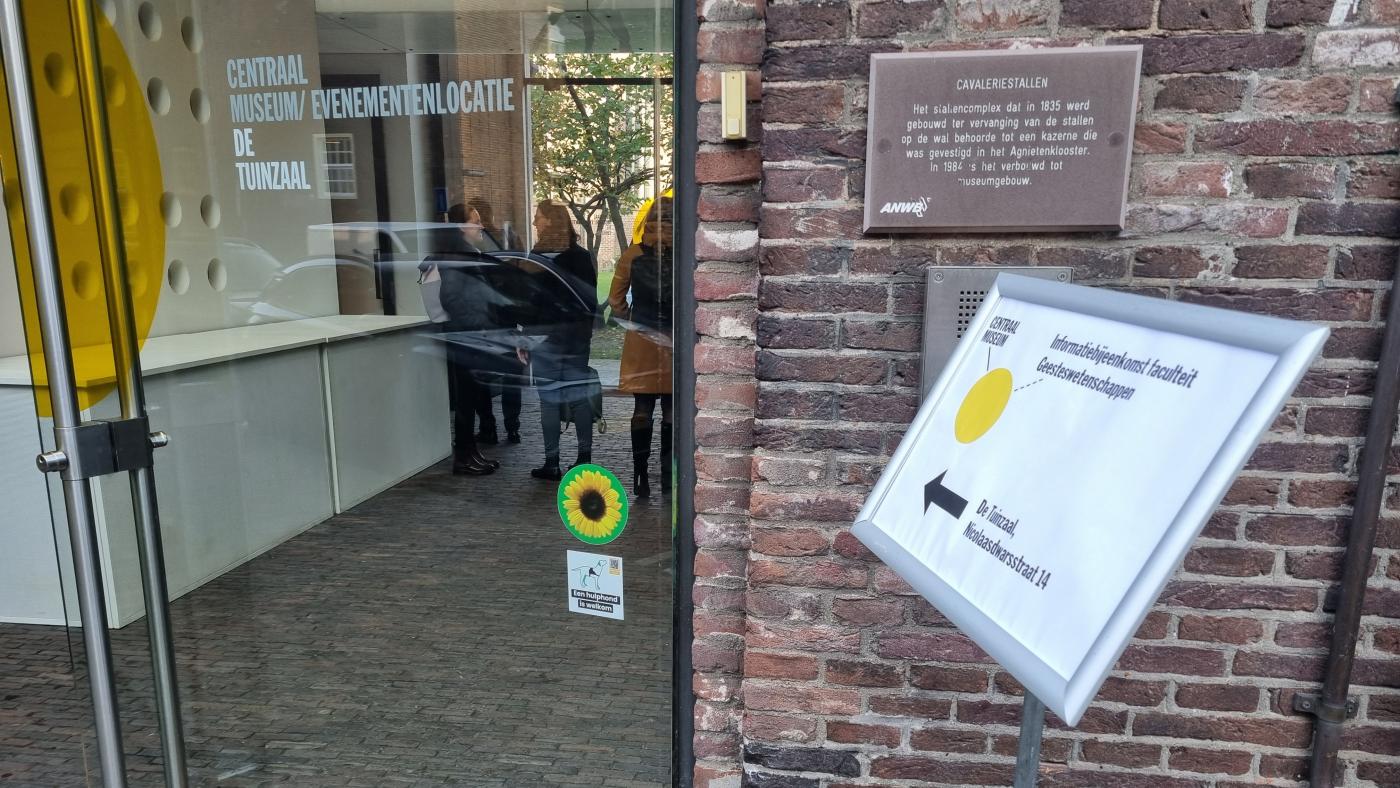More than 150 employees gathered
Humanities scholars concerned about faculty's future plans

How did the faculty board come to its decision? Why did it happen behind closed doors? Why were the study programmes concerned not involved? How can we judge if this is the right decision? Were any alternatives considered?
These and other questions were posed by the more than 150 people gathered in the Garden Room of the Central Museum on Tuesday afternoon. In this meeting, aimed at Dutch-speaking scholars, the faculty board explained its decision to terminate six programmes. A meeting with the international staff was held the next day.
The attendees were still recovering from the shock caused by the faculty's transition plan, which not only axes six study programmes but also states that education must be reorganised across the entire faculty.
Study programmes are expected to collaborate more and thus scale up. The faculty aims to attract more students thanks to interdisciplinary programmes and ensure that more students graduate on time. The board believes that this course of action would pull the faculty out of its financial misery. A more detailed plan for the renewed educational structure should be completed in eight months and result in a 10 percent cost reduction.
Angry employees
Some Humanities employees were angered, concerned and confused. However, the mood in the room was not so easy to describe. Though resignation would be the wrong word, many employees seemed rather beaten up. They seemed to still be processing the information, as a lot is still up in the air.
Everyone seemed convinced that the budget cuts cannot be avoided, but Philosophy Professor Ingrid Robeyns, who has been part of the protest movement WOinActie for years, criticised the universities' passive attitude. "What is UU doing to get the government's austerity measures off the table?", she wondered.
In her view, the current government benefits from universities' decision to cut their own flesh before the proposed measures have even been approved by the Senate and the House of Representatives. "It legitimises the cutbacks," she said. Her comment also seemed to be directed at UU President Anton Pijpers, also in the room.
Another attendee wondered whether the anticipated deficit of 13 million euros for the Faculty of Humanities couldn't be covered by the Executive Board. "In terms of total turnover, that is no more than a drop in the ocean, right?"
Urgency
Dean Thomas Vaessens stated that the budget cuts from The Hague and their impact on the Humanities budget are the main reason why all faculty staff had to gather in that room. However, the faculty had known for quite some time that it had to do something to keep education affordable. He would have preferred to have much more time to shape a more interdisciplinary approach to education, as that would have been less painful.
When asked by the audience why staff and co-determination councils were not involved in the process of drawing up the plan, Vaessens said it was urgent. In his opinion, seeking consensus would have taken up too much time. Time that is not available, because shortages are increasing. Therefore, he took his responsibility as a dean and used his legal powers. He acknowledged that the faculty is now confronted with a fait accompli. “At the same time, I am standing here to ask you to support me. I understand this is a difficult message.”
Consent
Faculty council members noted during and after the meeting that not everything was set in stone yet. The faculty council still has the right to advise on programme closures and to consent to the budget. Several measures from the transition plan have already been incorporated into the budget. The adjusted budget is on the agenda for a meeting in December. But, first, the council needs clearer information about the plans. That's why an additional meeting will be held in a week and a half. The council will undoubtedly also ask for further financial substantiation as hardly anything is mentioned about that in the transition plan.
Forced participation
Several audience members asked about the financial reasoning behind the plans and whether other options were considered. Religious Studies does not have a large influx of students, but some of its courses are very popular. Wasn't that taken into consideration?
The transition plan is a hard blow even for the programmes that attract many students and therefore are not being cancelled. They feel there is little reason for such a drastic intervention, but they are now forced to participate in a far-reaching education reshuffle. Is it worth it?
Dean Vaessens says he can provide figures, but wonders if that makes any sense. Canceling programmes but keeping permanent employees does not achieve the goal of reducing expenses by 10 percent. According to him, profits must come from the new education model and the frameworks that have been provided for a more efficient offering. "Besides, we will look at the strong brands that all programmes - including those that are now being closed - can contribute."
No turning back
When asked whether other options were considered, Vaessens mentioned several possibilities, such as cutting back on research time, extensifying education with large-scale lectures only, giving lecturers even more teaching tasks, and giving a strict reorganisation order to the departments. According to the dean, the wish to remain a broad faculty and keep the various disciplines on board turned out to be the decisive factor. They also hope that a reorganisation, if necessary, will be minimal.
Not everyone was convinced. Ewout van der Knaap, a Professor of German, noted that without strong disciplines, interdisciplinarity is not possible at all. He asked those present to pause for a moment and consider the symbolic meaning behind the disappearance of traditional small programmes in Utrecht. He warned that the decision to abolish those programmes can never be reversed.
“Undress me. I will teach in my underwear if I have to. But keep those programmes,” he concludes. The moving appeal leads to applause in the room.